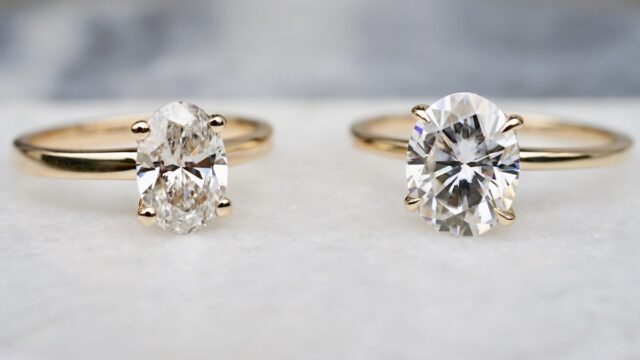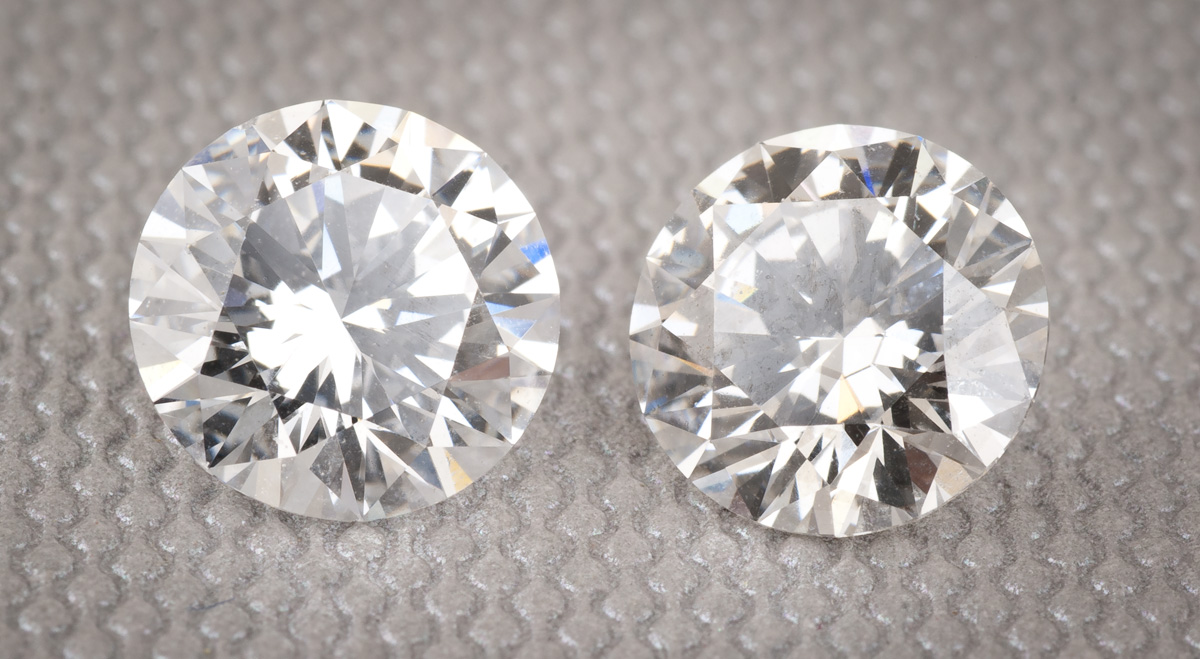
When it comes to choosing an engagement ring, couples are increasingly considering non-traditional options. Moissanite and lab-made diamonds provide a contemporary alternative choice for couples who want something extraordinary but don’t want to sacrifice quality.
But beyond the aesthetic appeal of these rings, what are the ethical considerations behind selecting a moissanite or lab-made diamond over traditionally mined diamonds? This article will explore the complex interplay between environmental impact, cost savings, and human rights in making this decision.
The Pros and Cons of Moissanite Engagement Rings
When it comes to choosing an engagement ring, couples have more options than ever before. Moissanite and lab-made diamonds are becoming increasingly popular as they offer a unique alternative to traditional diamonds at a fraction of the cost. But what are the pros and cons of moissanite engagement rings?
One of the main benefits is that moissanite stones provide excellent value for money. They come in various shapes and sizes, while still retaining their brilliance and sparkle – making them very attractive alternatives to natural diamond rings. Additionally, many people see them as ethically superior due to their laboratory origins which means that no mining or cutting operations were required for production. There are some drawbacks associated with moissanite too, however; one being durability.
While moissanites may look similar to diamonds, they lack the same level of hardness so can become scratched over time if not cared for properly – something worth considering before purchasing a piece of jewelry that will be worn often. Furthermore, depending on how closely you are looking at them it can sometimes be difficult to distinguish between real diamonds and man-made ones so shoppers should always check carefully once buying any type of stone ring online or in-store.
Understanding the Benefits of Lab-Made Diamonds

When it comes to non-traditional engagement rings, lab-made diamonds—also known as synthetic or cultured diamonds—are becoming a popular choice. Lab-made diamonds are created in a laboratory environment using cutting-edge technology that replicates the natural diamond formation process.
The results are identical to mined diamonds but without the ethical and environmental impacts associated with traditional mining practices. Understanding the benefits of lab-made diamonds is essential when considering an alternative ring option for your special day. Lab-made diamonds have many advantages over their mined counterparts.
Firstly, they are more affordable than natural gems due to lower production costs and no need for expensive extraction labor costs or equipment rental fees associated with traditional diamond mining operations. Additionally, because these stones do not involve any form of destructive digging or excavation processes, they cause significantly less harm to nature compared to mined gems—making them an eco-friendly choice for jewelry fans who want a guilt-free purchase.
Furthermore, shoppers can expect greater consistency in size and quality from lab-grown alternatives since each stone is produced under tightly controlled conditions meaning each one has more consistent clarity characteristics than its naturally formed counterpart would have achieved in nature’s randomness; thus making it easier for buyers to find exactly what they seek when searching online retailers such as MoissaniteCo.
Finally, customers benefit from guaranteed traceability when selecting engineered versions thanks to detailed documentation tracking records which show where the gem was made and how it was manufactured – offering complete transparency into its origins so you know exactly what youre getting before committing financially.
In conclusion, understanding the benefits of lab-made stones is key when looking at nontraditional options like moissanite rings for your special occasion; with improved affordability, sustainability & consistency all being desirable factors that come hand in hand with this artificial alternative – giving couples peace of mind about their purchasing decisions without breaking the bank!
Examining the Environmental Impact of Non-Traditional Diamonds
When it comes to choosing an engagement ring, the environmental impact of diamonds is often a concern. Fortunately, there are now more options available that don’t come with the same ethical dilemmas as traditionally mined diamonds. Moissanite and lab-made diamonds offer couples a way to make a romantic commitment without compromising their values.
Moissanite stones are entirely man-made and require no mining or harvesting of any kind. In addition to being conflict free, they also have much less of an environmental footprint than traditional diamonds do since they can be produced in laboratories using fewer resources. Lab-grown diamonds, on the other hand, use similar methods as natural diamond mining but on a much smaller scale; this means that while some energy is still used for production, it’s significantly lower than when obtaining mined stones from the Earth’s surface.
Both types of non-traditional diamond alternatives come with unique benefits for those looking for environmentally conscious ways to symbolize their love: moissanites provide an ethically sound option with minimal energy usage during production while lab-made gems offer couples access to quality carbon copies at a fraction of the cost of real ones which reduces demand for newly mined stones altogether.
No matter what your budget might be, you can find something that fits your needs without having to sacrifice your principles in order to express your affection – whether it’s through investing in eco-friendly moissanite or opting for synthetic yet indistinguishable lab-grown diamonds instead!
Evaluating Ethical Considerations for Choosing Non-Traditional Engagement Rings

When it comes to selecting an engagement ring, ethical considerations can be just as important as aesthetic ones. From the environmental impact of traditional diamonds to the human rights records of some diamond mines, couples have increasingly been looking for alternatives that don’t conflict with their values.
Moissanite and lab-made diamonds are two popular options for those seeking non-traditional rings – but what does choosing one over the other really mean? A key difference between these two materials is in how they’re made: moissanite is a naturally occurring mineral that can be mined from sources including Australia and Brazil; lab-made diamonds are created through a complex chemical process involving carbon atoms. Moissanite has lower environmental impacts than natural diamonds due to its smaller mining operations; while lab-made diamonds require fewer resources during production, meaning less strain on Earth’s finite resources.
Another important factor when evaluating ethical considerations is ensuring that workers involved in producing engagement rings are paid fair wages and treated ethically throughout the supply chain. The labor practices used to create moissanite vary greatly depending on where its sourced from; while many suppliers offer certification programs that guarantee humane working conditions — such as no child labor or forced overtime — others may not follow these standards.
On the other hand, since lab-created diamonds aren’t mined from any source, there isn’t any direct exploitation of laborers associated with them. Ultimately, couples should take into account both aesthetic elements and ethical considerations when selecting an engagement ring – regardless of whether they choose a traditional diamond or an alternative such as moissanite or a lab-created option. By doing so they will ensure their decision reflects their personal values – making their special day even more meaningful!
Exploring Alternative Options to Natural Diamonds
When it comes to engagement rings, couples are increasingly considering the ethical implications of their choice. Natural diamonds come with a heavy environmental and social cost, so exploring alternative options is becoming more popular. Moissanite and lab-made diamonds offer couples the opportunity to make an environmentally conscious decision while still having a beautiful symbol of love.
Moissanite is made from silicon carbide and has been gaining in popularity for its similar look to that of natural diamonds but at a fraction of the price. Additionally, moissanite does not have any known negative effects on the environment or human rights like those associated with traditional diamond mining practices.
Lab-made diamonds take this concept one step further by creating near-identical replicas of mined stones through advanced technology such as chemical vapor deposition (CVD) or high pressure-high temperature (HPHT). These realistic replicas provide buyers with greater assurance that they are making an ethical purchase without sacrificing aesthetics. This growing trend towards alternative gemstones offers many benefits for both engaged couples and the broader community alike; however, it also raises some questions about whether these choices should be considered equal to naturally occurring stones when celebrating relationships long into the future.
While there may never be one simple answer, exploring alternative options can help ensure our decisions align with our values – giving us all something truly priceless in return!







